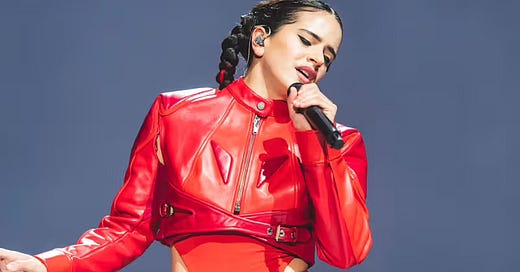Monday evening, my wife dragged me to a Rosalia concert at Radio City Music Hall. I say "dragged" because I'm typically more of a rainy day, moody folk guy—this vibrant Spanish artist wasn't exactly in my wheelhouse.
In the weeks leading up, I watched my wife transform: learning Spanish lyrics, decorating a jacket with Rosalia's album logo, even styling her hair to match. I couldn't help wondering what makes true fans so deeply shaped by the music they love. I'd listened to a few tracks, caught the general "vibe," but remained uncommitted.
Then the lights dimmed at Radio City. The first bass note hit my chest like a physical force. And suddenly, I got it.
Rosalia didn't just perform—she surrendered herself completely to every note, singing as if her entire existence depended on it. Rooted in her country's traditional Flamenco, her voice commanded the entire space. During her choreographed moments, she moved with precision, but in the attentive silences, she unleashed haunting solos that reverberated through all 6,000 of us, gripping something primal inside me.
What struck me most was how she connected with her audience. Weaving through the crowd, accepting gifts, having genuine conversations with fans. Despite English being her second language, she communicated universal truths that needed no translation.
But her passion—that's what shook me. I've spent years becoming more analytical, more measured. It's served me well professionally, helped me optimize myself. Yet watching Rosalia—this woman who held nothing back, who poured her entire soul into her art—awakened something I'd forgotten.
She didn't compromise who she was for a moment, yet somehow made each person feel deeply seen and understood. It was transformative.
Walking out, I realized I had zero desire to check emails or tick off to-dos. The small worries and critiques that usually occupy my mind seemed embarrassingly trivial. Her passion made me want to grab my guitar, to write from the heart, to give myself completely to moments without calculating outcomes.
In a world that charges you for every minute not devoted to productivity and reason, being passionate frees the soul of the illusionary burden of sensibility.
Coming from a Latin culture where late-night meals filled with conversation and music are the norm, Rosalia embodied this without question. As a regimented white American male who time-blocks and strictly hits the bed by 10pm, her show was the jolt I needed—a reminder of a different way of existing that resonated with a truer part of myself.
It's not about abandoning who I am, but unlocking a deeper dimension: giving myself fully to moments, releasing the grip on outcomes, and believing that this expression is fundamental to truly thriving.
As I reflected on my response to Rosalia's performance, something deeper emerged. There's a particular disconnection many of us men experience—a separation from our bodies, our intuition, our expressive capacity. We've been conditioned to live primarily from the neck up, processing everything through analytical frameworks rather than felt experience.
I recognized myself in this pattern. How many times had I intellectualized moments that were meant to be felt? How often had I retreated to the safety of analysis when faced with raw emotion? Standing there in that concert hall, watching not just Rosalia but the uninhibited way people responded to her, I saw the stark contrast between embodied presence and cerebral detachment.
Men like me often pride ourselves on stoicism and rationality while missing the profound intelligence that lives in our bodies, in our intuitive responses, in our capacity for passionate engagement. We become rigid and closed off, muscles tight with unexpressed energy, breathing shallow, senses dulled to the vibrancy around us.
The irony is that true masculinity isn't about disconnection or control—it's about channeling our power through passionate expression, intuitive action, and adaptive response. It's about having the courage to feel deeply, to move from authentic impulse rather than calculated strategy. What Rosalia embodied wasn't just artistic expression but a fundamental aliveness that transcends gender—though as men, we've been systematically separated from this birthright through cultural messaging that equates masculinity with emotional restraint.
Perhaps this is why the experience hit me so viscerally; it wasn't just about appreciating her art, but about recognizing a pathway back to a more integrated way of being a man in the world. One where my analytical mind serves my embodied wisdom rather than suppressing it. One where passion isn't something I witness in others but something I allow to move through me, unapologetically and without restraint.
Questions
When was the last time you felt truly passionate about something?
What helps you stay present in the moment?
What's holding you back from embracing passion in your daily life?
Quote
"It is the soul's duty to be loyal to its own desires. It must abandon itself to its master passion." -Rebecca West




Thank you for sharing about this experience Wes. Coincidentally, I had a very similar experience going to see Nick Cave live with someone who is a fan. I didn't know much about him myself, but I walked out of theater transported in a similar way, given a perspective on passionate expression that cut through the usual bullshit and was deeply nourishing of the spirit. I need to not let that imprint go so easily.
I was not expecting to read about Wes at a Rosalia concert but I loved your reflection! It’s good to be taken out of our routine and some artists are particularly good at stirring something in us.